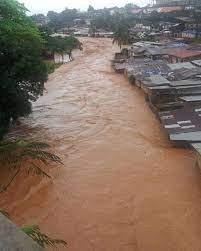Residents of Freetown have been regularly cautioned and reminded of the dangers of flood during the rains, by the Municipality Management of Freetown City Council (FCC), to beware of their various environmental activities, which have the propensities to cause another disastrous flash flood in the city if we are too careful about the handling of our drainages and scale up tree planting efforts.
On efforts at mitigating flood, we thankful to Her Worship, the Mayor, Madam Yvonne Aki-Sawyerr and her team of environmental experts for their constant cleaning and clearing of garbage from drainages across Freetown in furtherance towards preventing any eventual flood.
The preparedness by authorities to fully mitigate flood this year stems from lessons learnt from the last disaster the left hundreds of lives to Mount Sugar Loaf, in Mountain Rural District.
Today most of those displaced by that mudslide are presently residing at the Six Mile resettlement community. A place where most of them had not wanted to go in the first place, as there are no social services, ranging from pure drinking water, electricity and so many others needs are missing there due to the lack of attention from Government.
We therefore say never again to such disaster in Freetown and Sierra Leone as a whole and that no more displacements caused by mudslide and flash flood. So, our best options are to be handling our environment properly; avoid deforestation, bush burning and irresponsible garbage dumping in our drainages.
In heavily congested east of Freetown, central and other part of the country it is largely caused by deforestation, and misplaced garbage dumplings which block the water ways, as it used to be at Samba Gutter, downwards Kroo Bay, where residents are always worry about their safety during the peak of the rains more so at night. Authorities should put a penalty in place for defaulters as another way of curtailing such habits.
Flood and mudslides have caused several damages in catchment communities worth millions of Leone yet people hardly desert those places for reasons best known to them, and the Environmental Protection Agency and their sister agencies, also ensuring that residents do not erect structures on natural water ways in the city.
All disaster prone places as a result, need strong law enforcement efforts ensuring that people stay away from those dangerous environments to save lives and property, otherwise no matter the situation the topography of Freetown, it will always receive unexpected flooding whenever it rains heavily. Residents should be forcefully relocated as there is no two ways about it for people must vacate those disaster prone places as Susan’s Bay, Crab Town, Old Warf and so many other catchments, where people are trying to make comfortable livings, as means of prevention of loose of lives and property.
This is what was missing in previous years not until the mudslide disaster that killed so many people before authorities with leadership from the FCC, Office of National Security and other disaster management agencies get themselves readily prepared for the mitigation of flood in Freetown especially at this material time. Authorities should collectively ensure that people do not continue to reside in those communities, as part of their preventive and mitigation strategies.
It is of huge impact when FCC and its partners went round the city raising public awareness with effective sharing of distress call numbers to reach in the event of any trouble of such nature. That was a move in the right direction and it must be fully sustained going forward by way constantly educating the public especially heavily congested communities, where there are less or no dumpsites and people are totally dependent on the dumping of garbage in drainages.
In such situations whenever people clean their communities they dump the trash in drainages, which is not healthy for the general living of people living around those areas. Such habits must therefore be discouraged now if we are to see a Freetown environment without flood.
In making flood mitigation a must, people have to learn the new ways of waste management, by placing cans in their compounds to collect and later deposit their garbage into clearing tricycles instead of dumping them in drainages, as in east and elsewhere in Freetown people are in the habits of dumping garbage in drainages.
On that note, we therefore join authorities in their collectively wakeup call on all and sundry to desist from the habits of dumping garbage in drainages to avoid unnecessary flooding in their respective communities and the municipality of Freetown as a whole.











